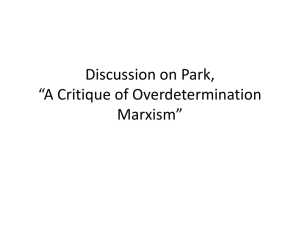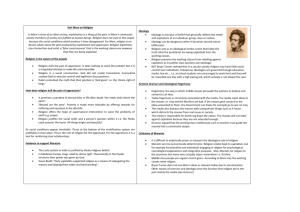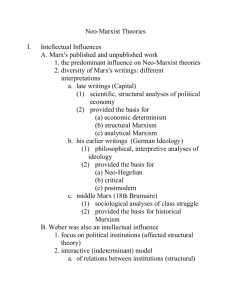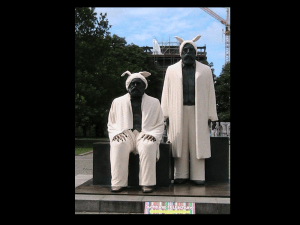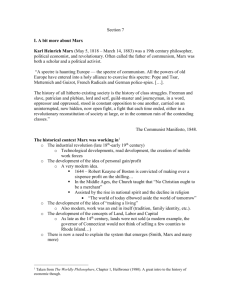Department of Adult Education, Community Development
advertisement
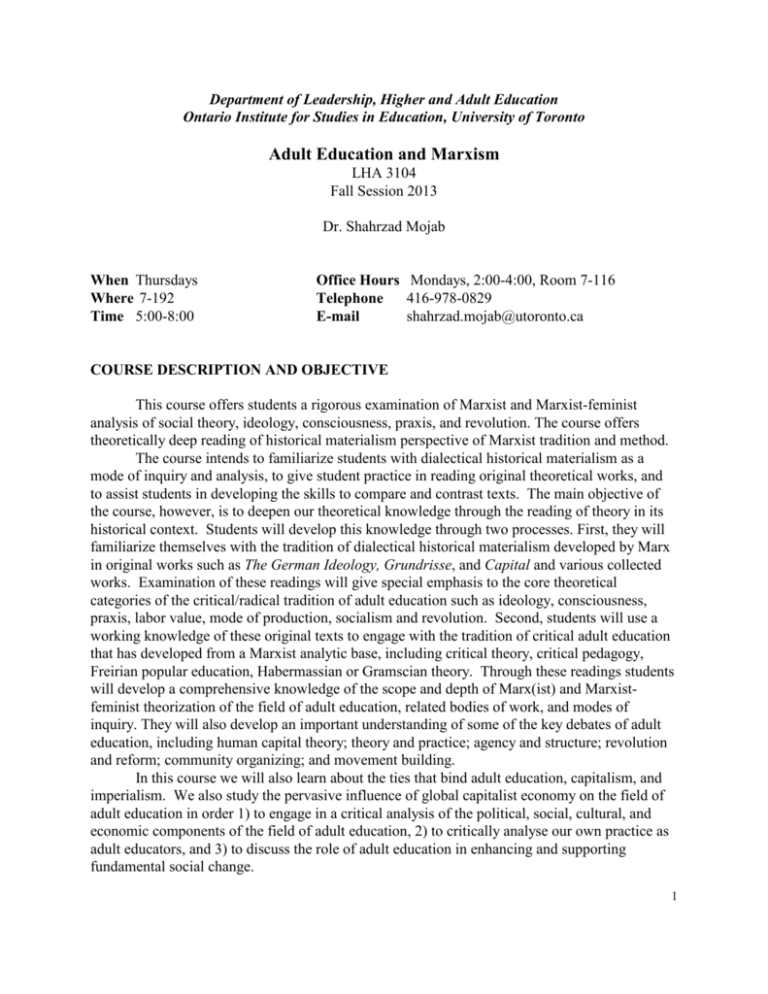
Department of Leadership, Higher and Adult Education Ontario Institute for Studies in Education, University of Toronto Adult Education and Marxism LHA 3104 Fall Session 2013 Dr. Shahrzad Mojab When Thursdays Where 7-192 Time 5:00-8:00 Office Hours Mondays, 2:00-4:00, Room 7-116 Telephone 416-978-0829 E-mail shahrzad.mojab@utoronto.ca COURSE DESCRIPTION AND OBJECTIVE This course offers students a rigorous examination of Marxist and Marxist-feminist analysis of social theory, ideology, consciousness, praxis, and revolution. The course offers theoretically deep reading of historical materialism perspective of Marxist tradition and method. The course intends to familiarize students with dialectical historical materialism as a mode of inquiry and analysis, to give student practice in reading original theoretical works, and to assist students in developing the skills to compare and contrast texts. The main objective of the course, however, is to deepen our theoretical knowledge through the reading of theory in its historical context. Students will develop this knowledge through two processes. First, they will familiarize themselves with the tradition of dialectical historical materialism developed by Marx in original works such as The German Ideology, Grundrisse, and Capital and various collected works. Examination of these readings will give special emphasis to the core theoretical categories of the critical/radical tradition of adult education such as ideology, consciousness, praxis, labor value, mode of production, socialism and revolution. Second, students will use a working knowledge of these original texts to engage with the tradition of critical adult education that has developed from a Marxist analytic base, including critical theory, critical pedagogy, Freirian popular education, Habermassian or Gramscian theory. Through these readings students will develop a comprehensive knowledge of the scope and depth of Marx(ist) and Marxistfeminist theorization of the field of adult education, related bodies of work, and modes of inquiry. They will also develop an important understanding of some of the key debates of adult education, including human capital theory; theory and practice; agency and structure; revolution and reform; community organizing; and movement building. In this course we will also learn about the ties that bind adult education, capitalism, and imperialism. We also study the pervasive influence of global capitalist economy on the field of adult education in order 1) to engage in a critical analysis of the political, social, cultural, and economic components of the field of adult education, 2) to critically analyse our own practice as adult educators, and 3) to discuss the role of adult education in enhancing and supporting fundamental social change. 1 This is an advanced (doctoral) level course; therefore, theoretical knowledge about the dynamics of state/market, imperialism, racism, colonialism, and feminisms is an asset in this course. APPROACH TO TEACHING AND LEARNING In teaching/learning settings, I see my role primarily as an analytical and reflective practitioner, planner and facilitator. We all will be involved in a participatory learning effort; your experience and input are as significant as the accumulated knowledge on the topic. You are, therefore, expected to actively contribute to the learning process. Your learning needs and agenda will be incorporated in the course as well. CLASS FORMAT Class sessions will operate as seminars. In collaborative learning we depend on one another to make the experience rich and useful. Therefore, I expect you to attend all class sessions and to actively participate in discussions. In order to enrich your participation, you are expected to devote sufficient time to reading, engage deeply with theoretical debates, and accomplishing learning activities prior to class sessions. LEARNING ACTIVITIES The primary objective of the learning activities is to enhance your doctoral level skills in theoretical analysis and engaged/critical reading and writing of texts. The learning activities for this course consist of one analytical review paper, one final research paper, and ongoing critical logs. In assessing your learning, I will focus attention on the following factors: 1. 2. 3. 4. An active level of participation. Evidence of your ability to integrate new knowledge and to effectively communicate your understanding in writing. Evidence of your ability to critically analyse and engage with alternative perspectives. Quality, clarity and focus in writing. Analytical Review Paper This learning activity will give you an opportunity to critically analyze and discuss the assigned readings of the course. The Analytical Review Paper should be no more than 1000 words. The review is not a description or a summation of one or more readings; it is rather an attempt to highlight the main arguments and the theoretical and methodological orientations of each piece of reading. I will return the review paper to you and will provide you with an overview of the class writings, that is, a summary of comments and strengths and weaknesses in the arguments and writings. 2 Length Grade Due Date 1000 words 30% the total grade October 17 Based on readings of a topic of the course, you will write an analytical review. In reviewing each reading, think about the following questions: ▸ ▸ ▸ ▸ ▸ ▸ ▸ What is the author’s main argument? How does the author support her/his argument? How does the author define key concepts? What are the political, personal, and intellectual implications of the author’s arguments? What is your critique of the author’s argument, assumptions, evidence? What questions does this reading raise for you? What did you learn from this reading? Final Research Paper This learning activity will indicate your grasp of topics covered in this course, your ability to critique and apply theoretical knowledge. In addition to an adequate knowledge of theory, your paper should demonstrate good writing skills. Length Grade Due Date 3000 words 40% of the total grade December 5 Critical Logs Keep a critical long throughout the course with focus on what you consider to be the most significant point or argument, something that resonate with your thinking and experience. Provide your reason for agreeing or disagreeing with authors. You are expected to share your thoughts and reflections in class as a way of contributing to the class discussion. Grade 30% of the total grade Please keep a copy of all your assignments and put your phone number and email address on the covering page. Electronic version of assignments, that is, fax, email messages, or attachments will NOT be accepted. The use of electronic devices is NOT permitted except with the instructor’s permission. 3 GREENING OUR CLASSROOM In support of the Department’s Environmental Policy, I encourage you to hand in your assignments on used paper, non-bleached recycled paper, and print double sided. Furthermore, please refrain from bringing disposable cups, dishes, cutleries into the classroom. COURSE READINGS Reading assignments include book chapters and a number of articles from diverse sources. Other readings may be assigned during the conduct of this course. We may also cover topics other than the ones listed for each week. In planning the seminar readings, I have made arrangements for the use of additional resources including video, film, or documentary presentations or guest speakers. The course pack is available at the University of Toronto Bookstore located at the Koffler Centre at 214 College Street (St. George and College Streets). Hours of operation are Monday to Friday from 8:45 am to 6:00 pm, Saturday from 10:00 am to 5:00 pm and Sunday from noon to 5:00 pm. The following book is available at the UT Library system. Bertell Ollman (2003). Dance of the Dialectic: Steps in Marx’s Method. Urbana and Chicago. Paula Allman (2001). Critical Education against Global Capitalism: Karl Marx and Revolutionary Critical Education. Westport, Ct: Bergin & Garvey. Sara Carpenter and Shahrzad Mojab (eds.) (2011). Educating from Marx; Race, Gender and Learning. New York: Palgrave. SEMINAR TOPICS AND READINGS September 12 Introducing the Course Selected Topics: Why this topic; review of the course outline; identifying our interests and learning objectives; the struggle over theory; why Marxism, Marxist-feminism, and why now? 4 September 19 & 26 Philosophical Foundation of Marxism and Capitalist Social Relations Selected Topics: Myth and misperception about Marx and education; historical development and trends in Marxism; dialectical conceptualization and capitalist social relations; historical materialism; theory of consciousness and praxis; understanding Marx’s method; idealism, ideology; mode of production in capitalism; class and class struggle. Marx, K. (1888). Theses on Feuerbach. In C. Arthur (Ed.) (1970), The German ideology (2nd ed., pp. 121-123). New York: International Publishers. Marx, K., & Engels, F. (1932). The German Ideology: “Introduction” and Part one. In C. Arthur (Ed.) (1970), The German ideology (2nd ed., pp. 39-95). New York: International Publishers. October 3 & 10 Dialectics: A Tool for Analysis and Action Selected Topics: reading Marxist conception of ‘dialectical,’ ‘historical-materialism’; understanding and analyzing social relations; internal relations; dialectical mode of thinking; human nature; and ethics. Bertell Ollman (2003). Dance of the Dialectic: Steps in Marx’s Method. Urbana and Chicago: University of Illinois Press. October 3 October 10 October 17 & 24 Steps 1-3 (pp. 1-112) Steps 4-5 (pp. 115-215) Theorizing Consciousness & Praxis Selected Topics: Social transformation; ideology as system of though versus epistemology; ontology; the question of “false” consciousness; alienation; revolutionary consciousness; class and class struggle; labour power; theory of value; social relations; essence and appearance; and political emancipation/human emancipation. Analytical Review Paper is Due Paula Allman (2001). Critical Education against Global Capitalism: Karl Marx and Revolutionary Critical Education. Westport, Ct: Bergin & Garvey. October 17 October 24 Chapter 2 (pp. 35-88) & Chapter 3 (pp. 89-160) Chapter 5 (pp.161-186) & Chapter 6 (pp.187-216) 5 October 31 Approaches to Ideology Jan Rehmann (2007). “Ideology Theory,” Historical Materialism 15: 211–239. Dorothy Smith (2011). “Ideology, science, and social relations: A reinterpretation of Marx’s epistemology,” in Sara Carpenter and Shahrzad Mojab (eds.) Educating from Marx; Race, Gender and Learning. New York: Palgrave: pp. 19-40. November 7 & 14 Marxism, Marxist-Feminism, Race, Gender, Culture, and Difference Frigga Haug, “Marx within Feminism,” 24 pages. Sara Carpenter (2012). “Centering Marxist-feminist theory in adult learning,” Adult Education Quarterly, 62 (1): 19-35. Abigail Bakan (2008), “Marxism and antiracism: Rethinking the politics of difference,” Rethinking Marxism: A Journal of Economics, Culture & Society, 20 (2): 238-256. Himani Bannerji (2011). “Building from Marx: Reflections on ‘race,’ gender and class,” in Sara Carpenter and Shahrzad Mojab (eds.) Educating from Marx; Race, Gender and Learning. New York: Palgrave: pp. 41-60. Tara Silver (2011). “Materiality and memory: A Marxist-feminist perspective on the “Cultural Turn” in adult education,” in Sara Carpenter and Shahrzad Mojab (eds.) Educating from Marx; Race, Gender and Learning. New York: Palgrave: pp. 191-210. November 21 & 28 State, Colonialism, Imperialism, Revolution & Socialism Selected Topics: Advancing socialism through adult education; crisis of capitalism and social transformation; revolutionary situation; and Marxist-feminist critique of learning theories. Shahrzad Mojab and Sara Carpenter (2011). “Epilogue: Living Revolution, Learning Revolution, Teaching Revolution,” in Sara Carpenter and Shahrzad Mojab (eds.) Educating from Marx; Race, Gender and Learning. New York: Palgrave: pp. 211-226. Sara Carpenter and Shahrzad Mojab (2013). “What is ‘critical’ about critical adult education?” in Tom Nesbit, Susan M. Brigham, Nancy Taber and Tara Gibb (eds.) Building on Critical traditions: Adult Education and Learning in Canada. Toronto, Ontario: Thompson Educational Publishing, Inc.: 160-170. 6 Frigga Haug (2009). “The ‘Four-in-one Perspective’: A manifesto for a more just life,” Socialism and Democracy, 23 (1): 119-123. John Holst (1999). “The affinities of Lenin and Gramsci: implications for radical adult education theory and practice,” International Journal of Lifelong Education, 18 (5): 407-421. John Holst (2009). “The Revolutionary Party in Gramsci’s Pre-Prison Educational and Political Theory and Practice,” Educational Philosophy and Theory, 41(6): 622-639. December 5 Reflection & Reading Excerpts from Critical Logs 7

